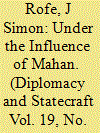|
|
|
Sort Order |
|
|
|
Items / Page
|
|
|
|
|
|
|
| Srl | Item |
| 1 |
ID:
114167


|
|
|
|
|
| Publication |
2012.
|
| Summary/Abstract |
The Advisory Committee on Problems of Foreign Relations (ACPFR) of Franklin D. Roosevelt's State Department first met in late December 1939 and operated until early Summer 1940. Its previously overlooked deliberations, chaired by the dynamic Under-Secretary of State Sumner Welles, are important in three related areas. First, the ACPFR was an early marker of the Administration's later post-war planning, notably the Advisory Committee on Postwar Foreign Policy. Second, a remarkable swath of issues were discussed surrounding the ongoing conflict, prospects for its end, and the shape of the post-war world, particularly regarding Europe and the consequences of a German victory. The third area of ACPFR importance is in illuminating our understanding of the Roosevelt Administration's thinking on the conflict during the complex atmosphere of the Phoney War. The analysis concludes that although the fruits of Committee's effort would be indirect, they were nonetheless important in later post-war planning efforts that contemplated a breadth of options for the post-war world before American lives were put in harm's way.
|
|
|
|
|
|
|
|
|
|
|
|
|
|
|
|
| 2 |
ID:
146045


|
|
|
|
|
| Summary/Abstract |
In attending the London Olympic Games of 2012, competitors and visitors at each venue were greeted with four flags; from left to right, they were the International Olympic flag—and the International Paralympic flag subsequently—the flags of the United Nations [UN] and the London Olympic Organising Committee [LOCOG], and the British Union Jack.
|
|
|
|
|
|
|
|
|
|
|
|
|
|
|
|
| 3 |
ID:
146046


|
|
|
|
|
| Summary/Abstract |
The actors, or “players,” involved in the transactions of diplomacy occasioned by sport are manifold. In the case of the world’s “global game”—association football—they include but are not limited to individual footballers, football clubs, national leagues, national associations, football’s international governance structures, multi-national sponsors, and numerous hangers on. Importantly for this analysis, such a panoply of actors creates an architecture, replicated across other sports, which speak to the necessity of furthering the understanding of the relationship between sport and diplomacy. These two phenomena share a long-standing similarity in global affairs; both having been over-looked as means of comprehending relations between different polities otherwise centred on the nation-state. This exegesis advances our understanding in two areas. First, it addresses the parameters of the discussion of “sport and diplomacy” and problematises the discourse between the two with a note on language; and second, it utilises a framework provided by an appreciation of “global diplomacy” to explore concepts of communication, representation, and negotiation in sport and diplomacy.
|
|
|
|
|
|
|
|
|
|
|
|
|
|
|
|
| 4 |
ID:
085135


|
|
|
|
|
| Publication |
2008.
|
| Summary/Abstract |
This article explores links in the grand strategic outlook of Theodore Roosevelt and Franklin Roosevelt, with particular reference to the influence upon both men of Admiral Alfred Thayer Mahan. It focuses upon an episode during Franklin Roosevelt's tenure as Assistant Secretary of the Navy, when he was in direct correspondence with both Theodore and Mahan on matters of grand strategy and naval policy. The paper argues that Theodore Roosevelt proved a crucial conduit in the formulation of Franklin Roosevelt's grand strategic outlook, both through his promulgation of Mahanian thought and his support of Franklin's correspondence with the Admiral. This in turn would be important later during Franklin Roosevelt's leadership of the United States.
|
|
|
|
|
|
|
|
|
|
|
|
|
|
|
|
|
|
|
|
|